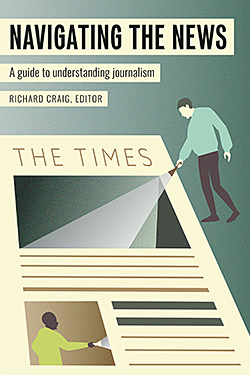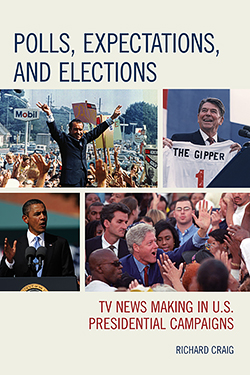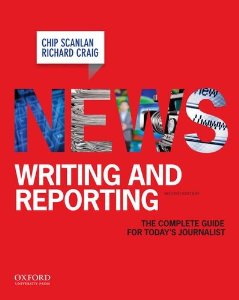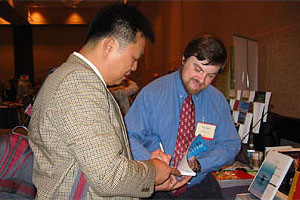


My fourth book, Navigating the News, has been published by Peter Lang Publishing!
My author page on Amazon.com:
https://www.amazon.com/~/e/B001IZXCTW.Navigating the News: A Guide to Understanding Journalism
Richard Craig, Editor
Peter Lang Publishing
First Edition
ISBN-10: 1433151286
ISBN-13: 978-1433151286
In an age when young people may confuse online chatter with legitimate news, Navigating the News is the first textbook designed to show students how to recognize credible reporting and how real journalists perform their jobs.

The book begins with the basics of how to critically assess news stories, then covers what to look for in everything from community news and crime reporting to business, political and investigative coverage. More than 50 professional journalists share insights on how they gather, edit and report news, and discuss what critical audiences should expect from their news coverage.
Students learn how to analyze complex topics including science, environmental and education news, and a series of chapters covers how to approach news from different parts of the world.
The mission of this text is simple: If students don’t recognize what real news is, Navigating the News is going to teach them.
I've written eight of the 19 chapters, and the rest were authored by colleagues from journalism and academia. My co-authors include: Scott Fosdick, Nisha Garud Patkar and Dona Nichols of San Jose State University, Tamara J. Welter and Michael A. Longinow of Biola University, distinguished freelance journalist Mollie Bloudoff-Indelicato, Brenda Bukowa of the University of Zambia, Ed Madison of the University of Oregon, Julie Patel Liss of California State University, Los Angeles, Frank Michael Russell of California State University, Fullerton and John Shrader of the University of Nebraska-Lincoln.
For more information about the book, click here to go to the book's page on the publisher's Web site.
To buy a copy from Amazon, click here. If you're an instructor considering adopting the book for your class, click here to order a review copy.
Polls, Expectations and Elections: TV News Making in U.S. Presidential Campaigns
By Richard Craig
Lexington Books
First Edition
ISBN-13: 978-0739191491
ISBN-10: 0739191497
In modern American presidential campaigning, scholars and citizens have bemoaned the effects of electronic media on voters. Much has been written about the supposed effects of TV ads, media management, perceived bias, and other issues, yet one element of today’s media environment that most Americans would recognize has not been identified in the public mind.

There is significant evidence that journalists regularly tell audiences what actions candidates should take on the campaign trail, based solely on whether they’re leading or trailing in public opinion polls. This is referred to as “expectation setting.”
The rise and proliferation of this phenomenon is documented through a comprehensive content analysis of transcripts of CBS Evening News broadcasts during presidential election campaigns from 1968–2012. This book provides numerous examples from these transcripts to illustrate how television news has gone from simply reporting poll data to portraying it as nearly the only motivation for anything candidates do while campaigning.
I argue that with the combination of heightened day-to-day coverage of campaigns and the omnipresence of poll data, in many election years campaign coverage has largely become a day-to-day series of contests, with candidates portrayed as succeeding or failing each day to meet “expectations” of what the candidate at their given position in the polls should do on the campaign trail.
For more information about the book, click here to go to the book's page on the publisher's Web site.
To buy a copy from Amazon, click here. If you're an instructor considering adopting the book for your class, click here to order a review copy.
News Writing and Reporting: The Complete Guide for Today's Journalist
By Chip Scanlan and Richard Craig
Oxford University Press
Second Edition
ISBN-13: 9780195188325
ISBN-10: 0195188322
Oxford University Press has released the textbook I've co-written with the Poynter Institute's veteran reporter and instructor Chip Scanlan. The book covers every aspect of news gathering, reporting and writing with today's news audiences in mind. It combines Chip's strong fundamentals and experience in all reporting situations with my own background in online journalism and new technologies.

Throughout the book, dozens of successful journalists have shared insights about the business and its changing nature. Each chapter contains numerous examples of storytelling techniques, information gathering strategies and other important elements of today's journalism. Tips and checklists offer practical advice, relevant questions and directions related to each section.A key element is the notion of coaching -- allowing young writers to use key questions and concepts to improve their own writing rather than simply telling them to approach stories in given ways. "The Coaching Way" boxes throughout the book provide guidance to help students take responsibility for their own work.
For more details about the book, click here to go to the book's page on the publisher's Web site.
To buy a copy directly from Oxford, click here. If you're an instructor considering adopting the book for your class, click here to order a review copy.
To buy a copy from Amaon, click here.
Online Journalism: Reporting, Writing, and Editing for New Media
By Richard Craig
Cengage Learning
First Edition
ISBN-13: 9780534531461
ISBN-10: 0534531466
Cengage Learning has released my textbook for online journalism classes. This is the first textbook built from the ground up to show students how to tailor their reporting, writing and editing skills specifically for the online medium. Instead of taking a standard writing or editing text and changing a few words here and there to create a “Web update,” every aspect of this book has been put together with online journalism in mind.
The chapters cover a wide variety of concepts that go beyond standard writing texts. For example, in the area of information gathering, students can learn advanced keyword searching techniques and get acquainted with high-powered databases that reporters use to dig deeper and find more specific types of information. In the section on writing, students are exposed to different styles and techniques of online writing and learn how to structure their writing to take advantage of the strengths of the medium. Later in the book, students learn about legal and ethical issues unique to online journalism, and can take a peek into the future as seen by online journalists themselves.
Signing books at the Cengage booth at the AEJMC conference in Toronto. More than 20 professional online journalists were interviewed for the book, and their comments and suggestions appear throughout the chapters. Audio clips from many of these professionals also appear on the book's Web site. In addition, from these interviews the book provides lots of real-world examples of the challenges and possibilities inherent within reporting, writing and editing for the online news venue.
The book is written in an engaging, accessible style to make it not only informative, but an enjoyable read for students of all levels. The approach is practical, but with an eye toward larger notions of understanding the role of a journalist online. Rather than simple memorization, the book aims to infuse students with an enthusiasm for the craft of online journalism that will reflect itself in their work.
To buy a copy from Amazon, click here.
To J&MC Home Page
To San José State University Home Page
Send comments and suggestions about this site to profcraig@profcraig.comProf. Richard Craig takes full responsibility for the information posted. San José State University has not reviewed or approved the contents of this page. Any views and opinions expressed on this page are strictly those of Prof. Richard Craig.



